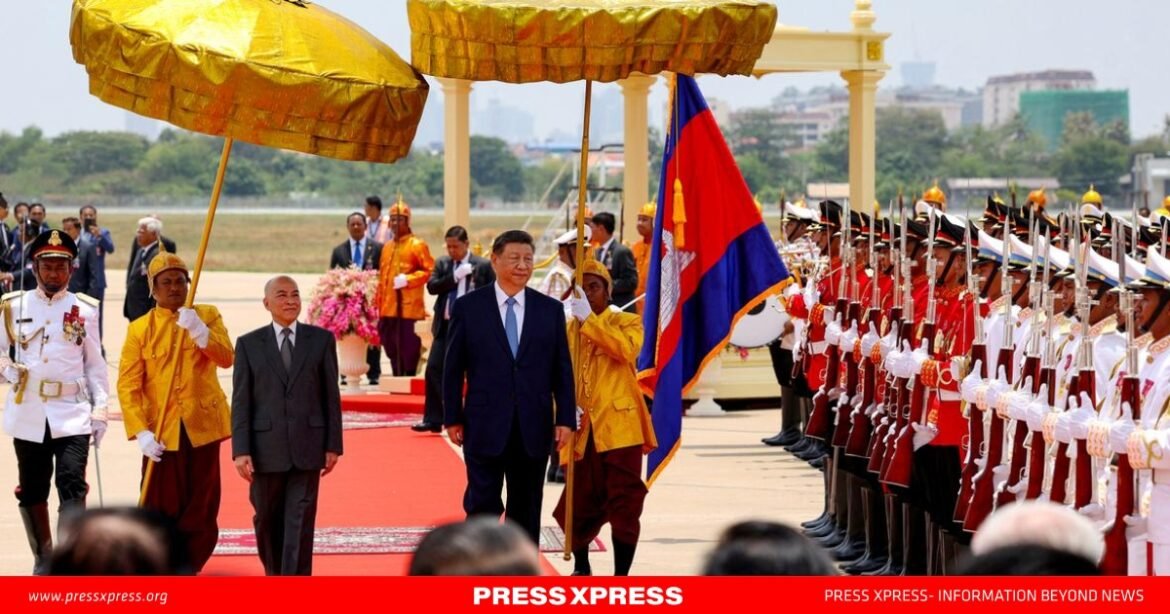Chinese President Xi Jinping’s visit to Cambodia from April 17-18, 2025, marked a significant milestone in Sino-Cambodian relations, underscoring a shared vision for long-term economic stability. This visit, Xi’s first in nine years, took place against the backdrop of an escalating trade war between China and the United States, which has shaken global financial markets and led to growing uncertainties for investors.
During the official visit, both countries reaffirmed their commitment to deepening trade, infrastructure, and industrial cooperation. Xi also addressed the Cambodian people ahead of their New Year celebrations, emphasizing the importance of a “China-Cambodia community with a shared future,” founded on mutual respect and development.
Cementing the Belt and Road Initiative
The visit highlighted China’s ongoing support for Cambodia under the Belt and Road Initiative (BRI), a framework that has made China the Kingdom’s largest trading partner and investor. In 2024, China accounted for nearly a third of Cambodia’s trade volume, a key factor in Cambodia’s economic diversification. As both countries seek to enhance their partnership, the BRI remains central to their joint ambitions in regional infrastructure and industrial growth.
With trade tariffs between the US and China escalating sharply, reaching 145% on Chinese imports to the US and prompting retaliatory moves from Beijing, the diplomatic timing of Xi’s visit was critical. Just before Xi’s arrival, the White House warned that China could face up to a 245% tariff on imports in response to its retaliatory actions, intensifying the ongoing trade battle.
Strengthening Regional Cooperation with a Broader Vision
Xi’s Southeast Asian tour, which included stops in Vietnam and Malaysia, showcased China’s broader strategy to counter US influence in the region. In Vietnam, China signed 45 cooperation agreements in diverse sectors, including artificial intelligence and supply chains, underscoring the importance of regional cooperation in facing global trade uncertainties. Similarly, agreements with Malaysia focused on trade, tourism, and infrastructure development, signaling China’s commitment to strengthening its ties across Southeast Asia.
In Cambodia, Xi’s meetings with key Cambodian leaders, including Prime Minister Hun Manet, focused on expanding the “Diamond Hexagon” cooperation framework, which encompasses politics, agriculture, energy, and people-to-people exchanges. This framework is seen as pivotal in strengthening Cambodia’s industrial capabilities and enhancing its global trade position.
Outcomes of the Visit: A Comprehensive Strategic Partnership
The official visit resulted in the signing of 37 agreements, reinforcing the countries’ Comprehensive Strategic Partnership. The agreements spanned multiple sectors, including agriculture, infrastructure, education, and tourism. Notably, both nations reaffirmed their commitment to advancing the Sihanoukville Special Economic Zone (SSEZ), a key project in Cambodia’s economic diversification efforts.
Additionally, Cambodia agreed to support China’s position on Taiwan and other territorial matters, signaling its continued alignment with Beijing on key geopolitical issues. The visit also saw the announcement of 2025 as the “Cambodia-China Tourism Year,” aimed at boosting bilateral tourism through joint marketing efforts and the development of new travel routes.
On the security front, the two nations pledged to strengthen cooperation in law enforcement, particularly in combating transnational crimes like cybercrimes, drug trafficking, and human smuggling.
Key Takeaways: Strengthening Cambodia’s Economic Resilience
Xi’s visit to Cambodia serves as a clear reaffirmation of the robust economic partnership between the two nations, with China continuing to play a central role in Cambodia’s long-term economic development. By advancing critical infrastructure projects, such as the Funan Techo Canal and the new Phnom Penh airport, China is positioning Cambodia to further diversify its economy and improve its industrial capacity.
With the backdrop of escalating global trade tensions, Xi’s visit has provided Cambodia with a strong economic ally in China, allowing it to buffer against the uncertainties of the ongoing US-China trade war. As both countries work together to expand their strategic cooperation, Cambodia’s role as a key partner in China’s broader regional goals will continue to grow.
This partnership not only enhances Cambodia’s economic standing but also reinforces its geopolitical significance within Southeast Asia.


